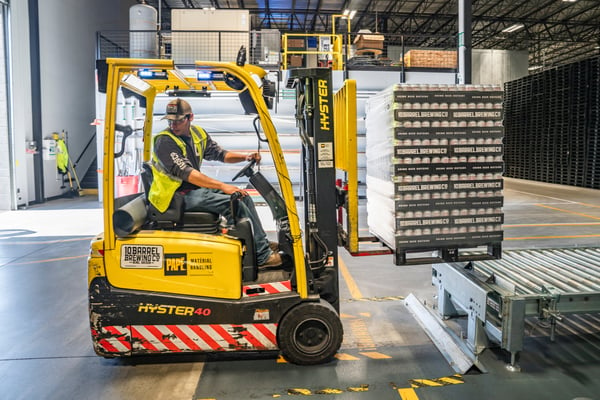Author
 Barry Chatham
Barry is a Business Consultant for EPLAN UK, working closely with the commercial team and a facilitator to the technical team in ensuring that EPLAN are delivering the right value at the right time to our customers.
Having graduated as an Industrial Designer and being deeply immersed in a wide range of disciplines, the learning curve in each of Barry's roles has been vast. This brings with it a wealth of experience, something demonstrable from recent years in CAD software such as Siemens PLM and more recently SolidWorks, where starting in technical and moving into commercial roles, Barry has successfully assisted hundreds of companies through transitional change and added value not only to his customers but heavily focusing on their customers and delivering results in dozens of different industries.
Having been asked the question years ago at an interview, it changed his outlook and discussions on the manufacturing industry, the question was "I make scissors in Sheffield as a consultant, I want you to make me more money"...
This question, and the "so what" methodology enabled Barry to see from a different perspective, something which is proving to be very well received with some of our customers already.
Chatham.b@eplan.co.uk
Barry Chatham auf LinkedIn
Barry Chatham
Barry is a Business Consultant for EPLAN UK, working closely with the commercial team and a facilitator to the technical team in ensuring that EPLAN are delivering the right value at the right time to our customers.
Having graduated as an Industrial Designer and being deeply immersed in a wide range of disciplines, the learning curve in each of Barry's roles has been vast. This brings with it a wealth of experience, something demonstrable from recent years in CAD software such as Siemens PLM and more recently SolidWorks, where starting in technical and moving into commercial roles, Barry has successfully assisted hundreds of companies through transitional change and added value not only to his customers but heavily focusing on their customers and delivering results in dozens of different industries.
Having been asked the question years ago at an interview, it changed his outlook and discussions on the manufacturing industry, the question was "I make scissors in Sheffield as a consultant, I want you to make me more money"...
This question, and the "so what" methodology enabled Barry to see from a different perspective, something which is proving to be very well received with some of our customers already.
Chatham.b@eplan.co.uk
Barry Chatham auf LinkedIn
Ignore Industry 4.0 at Your Peril
It’s widely accepted that, in the Western world, there have been up to now three industrial revolutions, each of which transformed the manufacturing sector. The first of these revolutions saw manual manufacturing displacing mechanised production using machines like mechanical looms. The second saw the spread of electrically powered mass production and the third, the adoption of electronics and information technology to automate manufacturing processes.
As each of these revolutions got underway, some manufacturing companies responded enthusiastically, while others clung to the old ways. History shows that companies in the first group usually prospered, while almost all of those in the second group ultimately failed. Remember, for example, the slow response of British companies to the third industrial revolution in the 1970s. This led to a rapid and painful decline in the British manufacturing sector, from which it is only now recovering.
Why is all this of interest right now? Because we are already experiencing the fourth industrial revolution, often dubbed Industry 4.0. And because the consequences for companies that ignore it will be just as dire as those experienced by the companies that ignored the previous revolutions. To put it bluntly, for manufacturers, Industry 4.0 is not optional; it’s a case of adopt it or perish.
But what exactly is Industry 4.0? Superficially it’s an initiative promoted by the German government to enhance manufacturing efficiency and flexibility. As far as it goes, this statement is true but it does little to reveal the true scope and potential of Industry 4.0. In reality, what it sets out to do is nothing less than to transform factories so that they become profit centres rather than cost centres.

Factories have, until now, always been cost centres. They make products in ever increasing volumes while struggling with constant pressures to cut costs to the bone.
The paradigm for the 21st Century, encapsulated in Industry 4.0, is to take full advantage of the possibilities opened up by the convergence of the physical and virtual worlds to turn factories into profitable innovation centres. This means harnessing new ideas and technologies including, for example, the Internet of Things (IoT), horizontal integration through value networks and the emergence of cyber-physical systems.
Only by adopting Industry 4.0 will manufacturers be able to implement flexibly organised production systems and integrated networking at every stage of the value chain – essentials if they are to respond effectively to critical challenges that include tougher and tougher competition, mounting cost pressures, increasingly complex products, shorter innovation cycles and depleted resources.
This is not the place to explore in detail the technologies underlying Industry 4.0. Interested manufacturers – and ideally that is all manufacturers – should however note that, although there is much work to be done before the full potential of Industry 4.0 is realised, most of the enabling technologies already exist. Indeed, the leading software and automation companies serving the manufacturing sector are investing heavily in developing and optimising these technologies.
Further, progressive businesses, including some of Europe’s biggest manufacturing organisations, have already begun gathering information and manufacturing intelligence by investing in highly automated and IT-driven production. This manufacturing intelligence means that these companies are starting to harness the potential of Industry 4.0 and to make significant progress toward the goal of profit-centre manufacturing.
There is, therefore, no good reason for procrastination; on the contrary, there is every reason for those companies that have not already done so to start investigating Industry 4.0 today. And, above all, it’s essential for all involved with manufacturing to remember that ignoring Industry 4.0 is, beyond all doubt, a path fraught with peril!
Would you like to know how EPLAN solutions can help you create a Smart Factory and modernise your processes?



Comments